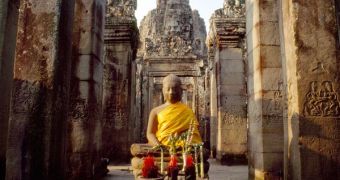An important religious artifact containing Buddha's bodily remains was stolen from its resting place in Cambodia. The urn was moved to the former royal city of the country in 2002 in a famous ceremony held by King Norodom Sihanouk and witnessed by thousands of people.
One of the guards on duty noticed the missing item after being awaken by a barking dog and seeing the shrine's door lock broken. When he looked inside, he had the shock of not seeing the praised golden urn. Officers started their investigation by questioning guards and potential suspects but still have no information about the artifact's location.
Buddhist followers and government officials are outraged by the happening and are searching to bring the responsible ones to justice. The relics have an enormous importance for the religious and cultural institutions of the country, and not only, as followers from all over the world came to see the golden urn holding parts of the idol's remains.
“This relic has been respected by Buddhist followers for thousands of years. This theft cannot be accepted. The perpetrator and any associates who connived to commit such a crime must be prosecuted according to the law of Cambodia,” one government spokesman said, according to Daily Mail.
Buddha, a praised idol who spent his life teaching and meditating, trying to find a means to end world suffering, is the central figure of one of the world's most important religions. His body is allegedly spread in different relics around Asia, where people come to pray for enlightenment and guidance in their spiritual journey.
This particular golden urn was resting in Cambodia's former capital city, Udong, in a castle that used to be the home of the royal family. The building is now a pilgrimage site as it holds many relics with a huge importance to the Buddhist religion.
Both police officers and Buddhist followers are trying to locate the precious artifact and return it to its resting place, as well as capturing the thieves and punishing them for the offense brought to the state and to the religious institutions.

 14 DAY TRIAL //
14 DAY TRIAL //